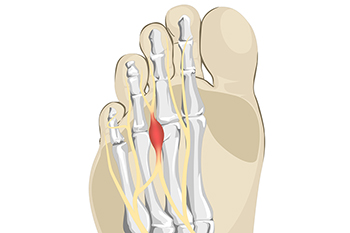Items filtered by date: September 2024
Podiatrists and Foot Conditions They Treat

A podiatrist is a medical specialist focused on diagnosing and treating conditions related to the feet, ankles, and lower legs. This healthcare professional addresses a wide range of issues, including common conditions such as bunions, plantar fasciitis, and heel spurs. They also manage injuries like fractures and sprains, as well as chronic conditions such as diabetes-related foot problems and arthritis. Podiatrists are skilled in prescribing orthotics and providing treatments to alleviate pain and restore function. Some of them also perform surgeries. They play a vital role in preventive care, offering guidance on proper footwear and foot hygiene. If you have any type of foot or ankle pain, it is suggested that you visit a podiatrist who can accurately diagnose the cause, and offer an effective treatment plan.
If you are experiencing pain in the feet or ankles, don’t join the stubborn majority refusing treatment. Feel free to contact Philip C. Caswell, DPM from Family Foot & Ankle Care. Our doctor can provide the care you need to keep you pain-free and on your feet.
What Is a Podiatrist?
Someone would seek the care of a podiatrist if they have suffered a foot injury or have common foot ailments such as heal spurs, bunions, arch problems, deformities, ingrown toenails, corns, foot and ankle problems, etc.
Podiatric Treatment
A podiatrist will treat the problematic areas of the feet, ankle or lower leg by prescribing the following:
- Physical therapy
- Drugs
- Orthotic inserts or soles
- Surgery on lower extremity fractures
A common podiatric procedure a podiatrist will use is a scanner or force plate which will allow the podiatrist to know the designs of orthotics. Patients are then told to follow a series of tasks to complete the treatment. The computer will scan the foot a see which areas show weight distribution and pressure points. The podiatrist will read the analysis and then determine which treatment plans are available.
If you have any questions please feel free to contact our office located in Sparta, NJ . We offer the newest diagnostic and treatment technologies for all your foot and ankle needs.
Definition and Risk Factors of Morton’s Neuroma

Morton’s neuroma, a painful condition affecting the foot, is caused by the thickening of nerve tissue usually between the third and fourth toes. This thickening leads to irritation and inflammation, which in turn causes discomfort and pain. The pain is typically felt in the ball of the foot and may radiate into the toes and is often described as a burning or sharp sensation. Risk factors include wearing tight, high-heeled shoes that compress the toes, engaging in high-impact sports, and having foot deformities like bunions or flat feet. Women are more frequently affected, due to footwear choices. If you have pain in the ball of your foot, it is suggested that you consult a podiatrist who can provide an accurate diagnosis and treatment.
Morton’s neuroma is a very uncomfortable condition to live with. If you think you have Morton’s neuroma, contact Philip C. Caswell, DPM of Family Foot & Ankle Care. Our doctor will attend to all of your foot care needs and answer any of your related questions.
Morton’s Neuroma
Morton's neuroma is a painful foot condition that commonly affects the areas between the second and third or third and fourth toe, although other areas of the foot are also susceptible. Morton’s neuroma is caused by an inflamed nerve in the foot that is being squeezed and aggravated by surrounding bones.
What Increases the Chances of Having Morton’s Neuroma?
- Ill-fitting high heels or shoes that add pressure to the toe or foot
- Jogging, running or any sport that involves constant impact to the foot
- Flat feet, bunions, and any other foot deformities
Morton’s neuroma is a very treatable condition. Orthotics and shoe inserts can often be used to alleviate the pain on the forefront of the feet. In more severe cases, corticosteroids can also be prescribed. In order to figure out the best treatment for your neuroma, it’s recommended to seek the care of a podiatrist who can diagnose your condition and provide different treatment options.
If you have any questions, please feel free to contact our office located in Sparta, NJ . We offer the newest diagnostic and treatment technologies for all your foot care needs.
Are You Suffering From Nerve Damage?
The Importance of Diabetic Foot Care

Diabetic foot care is essential for maintaining overall health and preventing serious complications. Regular foot exams are critical as they help detect any issues early, such as sores, infections, or changes in foot structure, which can be particularly dangerous for individuals with diabetes. Daily foot care is equally important, and this includes inspecting feet for any abnormalities, keeping them clean and moisturized, and trimming nails carefully to avoid cuts and infections. Adopting healthy foot habits, such as wearing well-fitting shoes and avoiding walking barefoot, significantly reduces the risk of injury and infection. By adhering to these practices, individuals with diabetes can manage their foot health effectively, preventing complications and promoting overall well-being. If you have diabetes, it is strongly suggested that you are under the care of a podiatrist who can help you to manage this potentially dangerous condition.
Diabetic foot care is important in preventing foot ailments such as ulcers. If you are suffering from diabetes or have any other concerns about your feet, contact Philip C. Caswell, DPM from Family Foot & Ankle Care. Our doctor can provide the care you need to keep you pain-free and on your feet.
Diabetic Foot Care
Diabetes affects millions of people every year. The condition can damage blood vessels in many parts of the body, especially the feet. Because of this, taking care of your feet is essential if you have diabetes, and having a podiatrist help monitor your foot health is highly recommended.
The Importance of Caring for Your Feet
- Routinely inspect your feet for bruises or sores.
- Wear socks that fit your feet comfortably.
- Wear comfortable shoes that provide adequate support.
Patients with diabetes should have their doctor monitor their blood levels, as blood sugar levels play such a huge role in diabetic care. Monitoring these levels on a regular basis is highly advised.
It is always best to inform your healthcare professional of any concerns you may have regarding your feet, especially for diabetic patients. Early treatment and routine foot examinations are keys to maintaining proper health, especially because severe complications can arise if proper treatment is not applied.
If you have any questions please feel free to contact our office located in Sparta, NJ . We offer the newest diagnostic and treatment technologies for all your foot and ankle needs.
Heel Pain Caused by Bursitis

Heel pain can be debilitating, and one common cause is bursitis. This condition occurs when the bursa, a small fluid-filled sac that cushions and lubricates the joints, becomes inflamed. In the case of heel bursitis, the bursa located at the back of the heel becomes irritated and swollen. The bursa is typically aggravated by activities that put pressure on the affected area, such as walking or wearing tight shoes. Inflammation can also be caused by repetitive overuse or direct trauma to the heel. Diagnosis usually involves a physical examination, and sometimes imaging tests like X-rays or ultrasound are used to rule out other conditions. In some cases, a podiatrist may recommend corticosteroid injections to alleviate pain and inflammation. If heel pain persists or disrupts daily activities, it is suggested you make an appointment with a podiatrist. This foot doctor can offer specialized treatment and personalized advice for effective pain management and recovery.
Many people suffer from bouts of heel pain. For more information, contact Philip C. Caswell, DPM of Family Foot & Ankle Care. Our doctor can provide the care you need to keep you pain-free and on your feet.
Causes of Heel Pain
Heel pain is often associated with plantar fasciitis. The plantar fascia is a band of tissues that extends along the bottom of the foot. A rip or tear in this ligament can cause inflammation of the tissue.
Achilles tendonitis is another cause of heel pain. Inflammation of the Achilles tendon will cause pain from fractures and muscle tearing. Lack of flexibility is also another symptom.
Heel spurs are another cause of pain. When the tissues of the plantar fascia undergo a great deal of stress, it can lead to ligament separation from the heel bone, causing heel spurs.
Why Might Heel Pain Occur?
- Wearing ill-fitting shoes
- Wearing non-supportive shoes
- Weight change
- Excessive running
Treatments
Heel pain should be treated as soon as possible for immediate results. Keeping your feet in a stress-free environment will help. If you suffer from Achilles tendonitis or plantar fasciitis, applying ice will reduce the swelling. Stretching before an exercise like running will help the muscles. Using all these tips will help make heel pain a condition of the past.
If you have any questions please contact our office located in Sparta, NJ . We offer the newest diagnostic and treatment technologies for all your foot and ankle needs.

